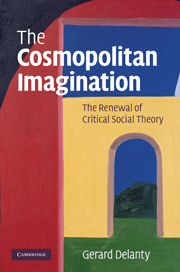Book contents
- Frontmatter
- Contents
- Preface and acknowledgements
- Introduction
- 1 The rise and decline of classical cosmopolitanism
- 2 Contemporary cosmopolitanism and social theory
- 3 Global ethics, solidarity and the problem of violence
- 4 Cosmopolitan citizenship and the post-sovereign state
- 5 Multiculturalism from a cosmopolitan perspective
- 6 Religion in a cosmopolitan society
- 7 Cosmopolitanism, modernity and global history
- 8 Cosmopolitanism and European political community
- 9 Europe as a borderland
- 10 Conclusion: inter-cultural dialogue in a post-Western world
- Bibliography
- Index
10 - Conclusion: inter-cultural dialogue in a post-Western world
Published online by Cambridge University Press: 18 January 2010
- Frontmatter
- Contents
- Preface and acknowledgements
- Introduction
- 1 The rise and decline of classical cosmopolitanism
- 2 Contemporary cosmopolitanism and social theory
- 3 Global ethics, solidarity and the problem of violence
- 4 Cosmopolitan citizenship and the post-sovereign state
- 5 Multiculturalism from a cosmopolitan perspective
- 6 Religion in a cosmopolitan society
- 7 Cosmopolitanism, modernity and global history
- 8 Cosmopolitanism and European political community
- 9 Europe as a borderland
- 10 Conclusion: inter-cultural dialogue in a post-Western world
- Bibliography
- Index
Summary
One of the main aims of this book has been to argue for the contemporary relevance of cosmopolitanism as a normative critique of globalization. This is not to set up a basic dichotomy of cosmopolitanism and globalization, since globalization is multi-faceted and cosmopolitanism, too, is highly varied. Some of the most important expressions of cosmopolitanism emerged in the context of major social transformations of an epochal and global nature: the eastward expansion of the Hellenistic Empire of Alexander the Great; the rise Confucian cosmopolitanism in the fifth to second centuries BCE during the period of the Warring States; the revival of the cosmopolitan idea in Europe in the seventeenth and eighteenth centuries as a result of the crisis of European absolutism; the re-emergence of cosmopolitanism in the aftermath of the Second World War; and, in the present day, the resurgence of cosmopolitanism with the post-sovereign state, the worldwide transformation of political community and the global crisis of capitalism. Rather than view cosmopolitanism as an alternative to globalization or to the nation-state – as some kind of utopian ideal of an alternative social and political order – the approach set out in this book has been to stress the embedded nature of cosmopolitanism in current societal developments. Globalization creates a world of enhanced connections, but does not itself constitute the cosmopolitan condition; instead it establishes preconditions for its emergence. Its capacity for transcendence is immanent rather than external.
- Type
- Chapter
- Information
- The Cosmopolitan ImaginationThe Renewal of Critical Social Theory, pp. 250 - 262Publisher: Cambridge University PressPrint publication year: 2009



